29.3.5.6 (29 > 18)
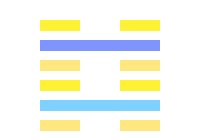
29.3.5.6 (29 > 18) - THE KHAN HEXAGRAM.
- 3. The third line, divided, shows its subject, whether he comes or goes ( = descends or ascends), confronted by a defile. All is peril to him and unrest. (His endeavours) will lead him into the cavern of the pit. There should be no action (in such a case).
- 5. The fifth line, undivided, shows the water of the defile not yet full, (so that it might flow away) ; but order will (soon) be brought about. There will be no error.
- 6. The topmost line, divided, shows its subject bound with cords of three strands or two strands, and placed in the thicket of thorns. But in three years he does not learn the course for him to pursue. There will be evil.
29.3.5.6 (29 > 18) - Refusing the approximations
One rules out taking sides with someone who has not been able to be rigourous.
Bing DeepL Google Yandex29.3.5.6 (29 > 18) - Refusing the approximations
One rules out taking sides with someone who has not been able to be rigorous.
Bing DeepL Google Yandex29.3.5.6 (29 > 18) - K’ân, l’abîme
K’ān : danger, précipice, caverne. — Tsa k’ān : courir de grands risques ; s’exposer au danger pour un autre.
- 3. Si en tout et partout on ne rencontre que danger, que les périls, les sujets de crainte s’accumulent, alors dans un tel danger, il n’y a plus d’expédient qui puisse servir. — Il n’y aura plus de secours possible.
- 5. Mais si le danger n’est pas inéluctable, si une caverne où l’on se trouve n’est point pleine d’eau et qu’on puisse encore aplanir le terrain, on en sortira sans faute. — Il n’arrivera pas malheur.
- 6. Danger de celui qui, lié, vinculé de triples liens, enfermé dans un cachot, ne peut de longtemps parvenir à se délivrer. Sort funeste ! — Tel est celui qui a perdu la voie de la sagesse
29.3.5.6 (29 > 18) - Refuser les à-peu-près
On exclut de prendre parti pour une personne qui n'a pas su faire preuve de rigueur.
Bing DeepL Google Yandex29.3.5.6 (29 > 18) - Mélység
- 3. Látják amit elrontott így odébbáll.
- 5. Mielőtt visszatérne hogy segítsen másokon, szünetet kell tartania és fel kell készülnie hogy válaszoljon a közelállóknak.
- 6. Ha túl fáradt, meg kell állnia és később folytatnia.
The trigrams
The trigrams are combinations of three yin and yang lines. The three bottom lines of the hexagram form the lower trigram and represent the inner situation. The three top lines form the upper trigram and represent the outer situation.
Upper trigram: The water The mountain


Lower trigram: The water The wind


The formation: 29
What is already there
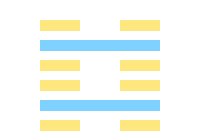
29 - THE KHAN HEXAGRAM.
Khan, here repeated, shows the possession of sincerity, through which the mind is penetrating. Action (in accordance with this) will be of high value.
Bing DeepL Google Yandex29 - K’ân, l’abîme
K’ān : danger, précipice, caverne. — Tsa k’ān : courir de grands risques ; s’exposer au danger pour un autre.
Texte
La droiture, le coeur fidèle et attaché, réussit ; ses actes ont de l’éclat s’il persévère malgré le danger.
Symbolisme
L’eau s’étendant au loin (deux fois eau) forme le Koua. Le sage, d’une vertu constante, agit vertueusement et s’applique à l’enseignement. Il répand ses biens comme l’eau.
Commentaire
Tsa k’ān est un danger grave. L’eau débordant, mais ne remplissant pas tout (que figure le Koua), représente les dangers courus sans qu’on perde sa fidélité constante. Le coeur attaché réussit ; quand la force garde le milieu, tout ce qu’on fait est bon et méritoire. Le ciel a ses dangers qu’on ne peut surmonter. La terre a les siens dans les montagnes, les fleuves et les ravins. Les rois et princes arrangent les choses dangereuses de manière à sauvegarder leurs États. Le moment du danger est bien grave.
29 - La profondeur
Quand les problèmes sont trop difficiles, on essaie de les contourner.
Bing DeepL Google Yandex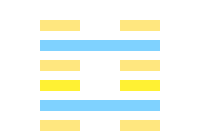
29.3 (29 > 48) - THE KHAN HEXAGRAM.
The third line, divided, shows its subject, whether he comes or goes ( = descends or ascends), confronted by a defile. All is peril to him and unrest. (His endeavours) will lead him into the cavern of the pit. There should be no action (in such a case).
Bing DeepL Google Yandex29.3 (29 > 48) - Leaving the field
Others notice what one has wasted, thus one leaves.
Bing DeepL Google Yandex29.3 (29 > 48) - Leaving the field
Others notice what one has wasted, thus one leaves.
Bing DeepL Google Yandex29.3 (29 > 48) - K’ân, l’abîme
K’ān : danger, précipice, caverne. — Tsa k’ān : courir de grands risques ; s’exposer au danger pour un autre.
Si en tout et partout on ne rencontre que danger, que les périls, les sujets de crainte s’accumulent, alors dans un tel danger, il n’y a plus d’expédient qui puisse servir. — Il n’y aura plus de secours possible.
Bing DeepL Google Yandex29.3 (29 > 48) - Abandonner le terrain
Les autres voient ce que l'on a gâché, alors on s'en va.
Bing DeepL Google Yandex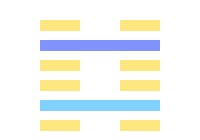
29.5 (29 > 7) - THE KHAN HEXAGRAM.
The fifth line, undivided, shows the water of the defile not yet full, (so that it might flow away) ; but order will (soon) be brought about. There will be no error.
Bing DeepL Google Yandex29.5 (29 > 7) - Going on vacation
Before returning to help others, one must take a break and prepare oneself to answer to one's relatives.
Bing DeepL Google Yandex29.5 (29 > 7) - Going on vacation
Before returning to help others, one must take a break and prepare oneself to answer to one's relatives.
Bing DeepL Google Yandex29.5 (29 > 7) - K’ân, l’abîme
K’ān : danger, précipice, caverne. — Tsa k’ān : courir de grands risques ; s’exposer au danger pour un autre.
Mais si le danger n’est pas inéluctable, si une caverne où l’on se trouve n’est point pleine d’eau et qu’on puisse encore aplanir le terrain, on en sortira sans faute. — Il n’arrivera pas malheur.
Bing DeepL Google Yandex29.5 (29 > 7) - Partir en congés
Avant de retourner aider les autres, on doit faire une pause et se préparer à répondre à ses proches.
Bing DeepL Google Yandex29.5 (29 > 7) - Mélység
Mielőtt visszatérne hogy segítsen másokon, szünetet kell tartania és fel kell készülnie hogy válaszoljon a közelállóknak.
Bing DeepL Google Yandex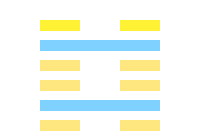
29.6 (29 > 59) - THE KHAN HEXAGRAM.
The topmost line, divided, shows its subject bound with cords of three strands or two strands, and placed in the thicket of thorns. But in three years he does not learn the course for him to pursue. There will be evil.
Bing DeepL Google Yandex29.6 (29 > 59) - Pausing
When it is too tiring, one can stop and resume later.
Bing DeepL Google Yandex29.6 (29 > 59) - Pausing
When it is too tiring, one can stop and resume later.
Bing DeepL Google Yandex29.6 (29 > 59) - K’ân, l’abîme
K’ān : danger, précipice, caverne. — Tsa k’ān : courir de grands risques ; s’exposer au danger pour un autre.
Danger de celui qui, lié, vinculé de triples liens, enfermé dans un cachot, ne peut de longtemps parvenir à se délivrer. Sort funeste ! — Tel est celui qui a perdu la voie de la sagesse
Bing DeepL Google Yandex29.6 (29 > 59) - Mettre en pause
Quand c'est trop fatiguant, on peut s'arrêter et reprendre plus tard.
Bing DeepL Google Yandex29.6 (29 > 59) - Mélység
Ha túl fáradt, meg kell állnia és később folytatnia.
Bing DeepL Google YandexIn the making: 18
What is poised to happen

18 - THE KÛ HEXAGRAM.
Kû indicates great progress and success (to him who deals properly with the condition represented by it). There will be advantage in (efforts like that of) crossing the great stream. (He should weigh well, however, the events of) three days before the turning point, and those (to be done) three days after it.
Bing DeepL Google Yandex18 - Disorder
One needs to abandon their affairs and make oneself available to patiently soften one's most embarrassing flaws, so that one can inspire confidence and be engaged by those who can help them.
Bing DeepL Google Yandex18 - Disorder
One needs to abandon their affairs and make oneself available to patiently soften one's most embarrassing flaws, so that one can inspire confidence and be engaged by those who can help them.
Bing DeepL Google Yandex18 - Kù, l’élimination de la chose pourrie
[color=blue]Kū : délibération, embarras, trouble, soucis.
Texte
La délibération, chose éminemment utile, fera triompher des difficultés. On doit délibérer trois jours avant d’agir ; puis trois jours après (sur les conséquences).
Symbolisme
C’est le vent sous la montagne. Le fort au-dessus, le petit au- dessous ; soumission chez l’un, droiture ferme chez l’autre ; c’est ce que représente le Koua kū. Aussi le grand doit encourager le peuple et développer les vertus.
Commentaire
Si l’on délibère sagement, le monde sera bien gouverné. Quand on va à une affaire, on doit délibérer trois jours avant et trois jours après.
18 - Le désordre
On a besoin d'abandonner ses affaires et se rendre disponible pour adoucir patiemment ses défauts les plus gênants, afin de pouvoir inspirer confiance et être engagé par ceux qui peuvent nous aider.
Bing DeepL Google Yandex18 - Rendetlenség
Fel kell hogy hagyjon az üzlettel
és hogy rendelkezésre állva türelmesen tompítsa a legtöbb kínos hibát, hogy képes legyen bizalmat sugallni és segítőtársakra leljen.
The nuclear hexagram: 27.2.4.6 (27 > 54)
The nuclear hexagram is the association of the two inner trigrams (lines 2,3,4 and 3,4,5). It represents the root, or the origin of the situation.
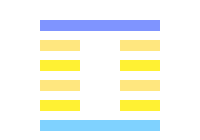
27.2.4.6 (27 > 54) - THE Î HEXAGRAM.
- 2. The second line, divided, shows one looking downwards for nourishment, which is contrary to what is proper ; or seeking it from the height (above), advance towards which will lead to evil.
- 4. The fourth line, divided, shows one looking downwards for (the power to) nourish. There will be good fortune. Looking with a tiger's downward unwavering glare, and with his desire that impels him to spring after spring, he will fall into no error.
- 6. The sixth line, undivided, shows him from whom comes the nourishing. His position is perilous, but there will be good fortune. It will be advantageous to cross the great stream.
27.2.4.6 (27 > 54) - Having allergies
One envies those who take pleasure in feeding themselves this way.
Bing DeepL Google Yandex27.2.4.6 (27 > 54) - Having allergies
One envies those who take pleasure in feeding themselves this way.
Bing DeepL Google Yandex27.2.4.6 (27 > 54) - I, l’alimentation
Ī : 1. Entretenir, soutenir ; 2. Menton, côté de la bouche ; 3. Profond.
- 2. Baisser le menton, c’est renverser les lois morales. Le lever vers les hauteurs, c’est aller au mal, au malheur. (Ces deux expressions désignent ceux qui font les parasites près des petits et près des grands — ou plutôt : ceux qui s’avilissent ou visent trop haut.)
- 4. Celui qui cherche la nourriture comme un tigre avançant pas à pas et regardant fixement, réussira en ses désirs.
-
6. Rechercher les moyens d’entretenir les hommes est une excellente chose quoique difficile ; elle réussira avantageusement (si l’on s’y applique).
On en retirera l’approbation universelle.
27.2.4.6 (27 > 54) - Avoir des allergies
On envie ceux qui prennent du plaisir à s'alimenter de la sorte.
Bing DeepL Google Yandex27.2.4.6 (27 > 54) - Ellátás
- 2. Nem keresi távol azt, amit megtalál a környezetében is.
- 4. Felméri a lehetőségeket.
- 6. Megvizsgálja mielőtt kielégítené az igényeket.
Ruler
The starting situation

29.6 (29 > 59) - THE KHAN HEXAGRAM.
The topmost line, divided, shows its subject bound with cords of three strands or two strands, and placed in the thicket of thorns. But in three years he does not learn the course for him to pursue. There will be evil.
Bing DeepL Google Yandex29.6 (29 > 59) - Pausing
When it is too tiring, one can stop and resume later.
Bing DeepL Google Yandex29.6 (29 > 59) - Pausing
When it is too tiring, one can stop and resume later.
Bing DeepL Google Yandex29.6 (29 > 59) - K’ân, l’abîme
K’ān : danger, précipice, caverne. — Tsa k’ān : courir de grands risques ; s’exposer au danger pour un autre.
Danger de celui qui, lié, vinculé de triples liens, enfermé dans un cachot, ne peut de longtemps parvenir à se délivrer. Sort funeste ! — Tel est celui qui a perdu la voie de la sagesse
Bing DeepL Google Yandex29.6 (29 > 59) - Mettre en pause
Quand c'est trop fatiguant, on peut s'arrêter et reprendre plus tard.
Bing DeepL Google Yandex29.6 (29 > 59) - Mélység
Ha túl fáradt, meg kell állnia és később folytatnia.
Bing DeepL Google YandexCorrection
The direction where the ruler is going to bend
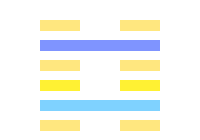
29.3.5 (29 > 46) - THE KHAN HEXAGRAM.
- 3. The third line, divided, shows its subject, whether he comes or goes ( = descends or ascends), confronted by a defile. All is peril to him and unrest. (His endeavours) will lead him into the cavern of the pit. There should be no action (in such a case).
- 5. The fifth line, undivided, shows the water of the defile not yet full, (so that it might flow away) ; but order will (soon) be brought about. There will be no error.
29.3.5 (29 > 46) - Expecting a negative answer
One replenishes oneself until the storm comes.
Bing DeepL Google Yandex29.3.5 (29 > 46) - Expecting a negative answer
One replenishes oneself until the storm comes.
Bing DeepL Google Yandex29.3.5 (29 > 46) - K’ân, l’abîme
K’ān : danger, précipice, caverne. — Tsa k’ān : courir de grands risques ; s’exposer au danger pour un autre.
- 3. Si en tout et partout on ne rencontre que danger, que les périls, les sujets de crainte s’accumulent, alors dans un tel danger, il n’y a plus d’expédient qui puisse servir. — Il n’y aura plus de secours possible.
- 5. Mais si le danger n’est pas inéluctable, si une caverne où l’on se trouve n’est point pleine d’eau et qu’on puisse encore aplanir le terrain, on en sortira sans faute. — Il n’arrivera pas malheur.
29.3.5 (29 > 46) - Attendre une réponse défavorable
On se remplume en attendant l'orage qui vient.
Bing DeepL Google Yandex29.3.5 (29 > 46) - Mélység
- 3. Látják amit elrontott így odébbáll.
- 5. Mielőtt visszatérne hogy segítsen másokon, szünetet kell tartania és fel kell készülnie hogy válaszoljon a közelállóknak.

